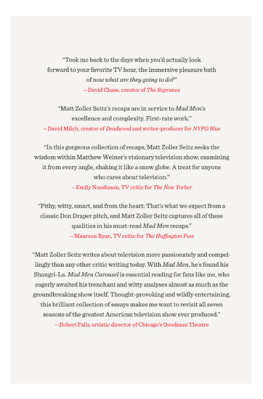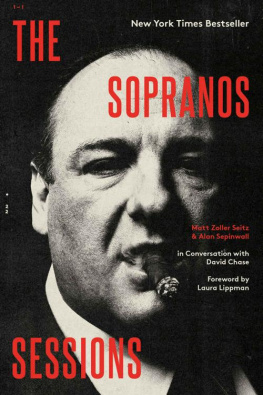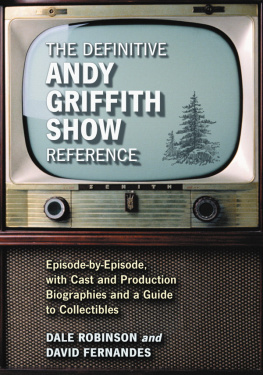


Dedicated to Amy
Contents
S1 / E1
Smoke Gets in Your Eyes
S1 / E2
Ladies Room
S1 / E3
Marriage of Figaro
S1 / E4
New Amsterdam
S1 / E5
5G
S1 / E6
Babylon
S1 / E7
Red in the Face
S1 / E8
The Hobo Code
S1 / E9
Shoot
S1 / E10
Long Weekend
S1 / E11
Indian Summer
S1 / E12
Nixon vs. Kennedy
S1 / E13
The Wheel
S2 / E1
For Those Who Think Young
S2 / E2
Flight 1
S2 / E3
The Benefactor
S2 / E4
Three Sundays
S2 / E5
The New Girl
S2 / E6
Maidenform
S2 / E7
The Gold Violin
S2 / E8
A Night to Remember
S2 / E9
Six Month Leave
S2 / E10
The Inheritance
S2 / E11
The Jet Set
S2 / E12
The Mountain King
S2 / E13
Meditations in an Emergency
S3 / E1
Out of Town
S3 / E2
Love Among the Ruins
S3 / E3
My Old Kentucky Home
S3 / E4
The Arrangements
S3 / E5
The Fog
S3 / E6
Guy Walks into an Advertising Agency
S3 / E7
Seven Twenty Three
S3 / E8
Souvenir
S3 / E9
Wee Small Hours
S3 / E10
The Color Blue
S3 / E11
The Gypsy and the Hobo
S3 / E12
The Grown Ups
S3 / E13
Shut the Door. Have a Seat
S4 / E1
Public Relations
S4 / E2
Christmas Comes But Once a Year
S4 / E3
The Good News
S4 / E4
The Rejected
S4 / E5
The Chrysanthemum and the Sword
S4 / E6
Waldorf Stories
S4 / E7
The Suitcase
S4 / E8
The Summer Man
S4 / E9
The Beautiful Girls
S4 / E10
Hands and Knees
S4 / E11
Chinese Wall
S4 / E12
Blowing Smoke
S4 / E13
Tomorrowland
S5 / E1&2
A Little Kiss
S5 / E3
Tea Leaves
S5 / E4
Mystery Date
S5 / E5
Signal 30
S5 / E6
Far Away Places
S5 / E7
At the Codfish Ball
S5 / E8
Lady Lazarus
S5 / E9
Dark Shadows
S5 / E10
Christmas Waltz
S5 / E11
The Other Woman
S5 / E12
Commissions and Fees
S5 / E13
The Phantom
S6 / E1&2
The Doorway
S6 / E3
Collaborators
S6 / E4
To Have and to Hold
S6 / E5
The Flood
S6 / E6
For Immediate Release
S6 / E7
Man with a Plan
S6 / E8
The Crash
S6 / E9
The Better Half
S6 / E10
A Tale of Two Cities
S6 / E11
Favors
S6 / E12
The Quality of Mercy
S6 / E13
In Care Of
S7 / E1
Time Zones
S7 / E2
A Days Work
S7 / E3
Field Trip
S7 / E4
The Monolith
S7 / E5
The Runaways
S7 / E6
The Strategy
S7 / E7
Waterloo
S7 / E8
Severance
S7 / E9
New Business
S7 / E10
The Forecast
S7 / E11
Time & Life
S7 / E12
Lost Horizon
S7 / E13
The Milk and Honey Route
S7 / E14
Person to Person
Foreword
The world of men is dreaming, it has gone mad in its sleep, and a snake is strangling it, but it cant wake up.
D. H. LAWRENCE
A
I t has become commonplace to draw parallels between todays more ambitious television shows and the novel, or even to claim that the most artful of these showsrich with social commentary, complicated story arcs, and dense character psychologyhave supplanted the novel. Overused, the comparison has been drained of meaning, sealing over both the visual pleasures and sensory urgency that TV shows can offer and the intimacy and immersiveness of our favorite novels. When one considers Mad Men, however, the comparison feels closer. And the show itself, thick with literary allusions, certainly encourages itfrom Dante and Freud to Susann and Puzo, has a show ever shown so many characters reading? Creator Matthew Weiner himself has noted that when he first read John Cheever, he thought, This man sounds like I want to sound: beautiful and sad.
The most compelling evidence of Mad Mens literariness, however, is found not in the show itself, but in the way it has been readdissected, deconstructed, laid upon the operating table week after week by an ever-expanding army of recappers, live tweeters, conspiracy theorists, and web sleuths. While many shows inspire online frenzies of speculation and theorizing, the Mad Men canon is remarkable both in its arcane depths and its intellectual rigor. But the voice striking clear as a bell above all that glorious noise has always been the analysis offered by Matt Zoller Seitz. Like the strongest and most incisive of literary criticism, his Mad Men pieces expand our view of the show and the issues it raises. So, if a recap oeuvre can read like lit critcan make us see depths and meaning far beyond our own viewing experiencethen it seems Mad Men does in fact work, and sing, and drown us like the most captivating of novels. The ones that feel like fever dreams.
Unlike most recaps, which are transitory productions, Seitzs Mad Men pieces are telescopic, enabling us to see not just the small details we might miss but how these moments fit inor complicatethe shows larger contexts. Seitz is constantly racking focus between the episode itself and the shows recurring big themes: the nature of identity, self-knowledge, the burden of the past, identity and reinvention, character stasis and evolution. At the same time, he can narrow our gaze to a moment so subtle we may have missed it and that may make us rethink the episode, a character, even the series in total. Witness Seitz on Betty Draper in season sevens Field Trip, lighting her cigarette and putting on her sunglasses after a particularly tense encounter with her son Bobby. Its a moment that, Seitz notes, serves as a crushing dismissal of her son. But rather than using it simply as evidence of Bettys cruelty, Seitz reminds us that what Betty is doing most of all in that episode is punishing herself (by not eating, by shutting herself off from her son, by retreating from an experience she was enjoying and then judging herself for it later)an observation that is surprising and immediately feels deeply true.
For Seitz, the show can not only sustain such analysis, it demands it, bidding us not just to watch the show but to scrutinize it. Such a role suits the shows larger fixation with the slipperiness of identity, the self behind the self, and as engaged viewers we are complicit in that fixation. We must be on the lookout for deceptions and self-deceptions, Seitz writes, and the gap between how characters see themselves... and who they likely are. If we do not participate critically, we are missing at least half of what matters. Our interpretation is part of the show, enlarges it, completes it. Its a dance, a shell game, a pitch, fictions traded for fictions. And wed better have our back up and our stories straight.
Which brings us back to literary criticism. In Aspects of the Novel, his classic study of the form, E. M. Forster asserts that mystery is essential to plot, but to experience its full effect one must go beyond a what-will-happen-next mode of reading. To appreciate a mystery, he writes, part of the mind must be left behind, brooding, while the other part goes marching on. This observation calls to mind both
Next page












